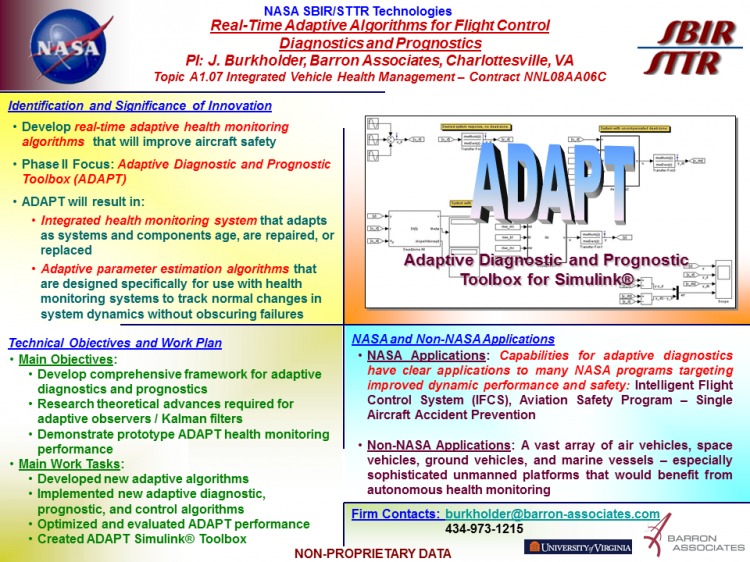Real-Time Adaptive Algorithms for Flight Control Diagnostics and Prognostics
The overall objective of this research program was to improve the affordability, survivability, and service life of next generation aircraft through the use of ADAPT — an integrated adaptive diagnostic and prognostic toolbox. ADAPT may be used in real time to obtain structural, flight control, and propulsion diagnostic information and transfer this information to a prognostic module that can estimate components’ remaining useful service life. ADAPT utilizes on-board sensors and data processing to achieve a low-cost, real-time autonomous health monitoring solution. Using real-time health status information, the aircraft may reconfigure itself to mitigate problems or operate in a degraded mode, which will allow for the completion of the mission, survival of the aircraft, and scheduling of maintenance at convenient times.
The specific focus of the research effort was adaptive diagnostic and prognostic algorithms for systems with uncertain and/or slowly-varying dynamics. Model-based machinery diagnostic and prognostic techniques depend upon high-quality mathematical models of the plant. Modeling uncertainties and errors decrease system sensitivity to faults and decrease the accuracy of failure prognoses. However, the behavior of many physical systems changes slowly over time as the system ages. These changes may be perfectly normal and not indicative of impending failures; however, if a static a priori model is used, modeling errors may increase over time, which can adversely effect health monitoring system performance. Clearly, one method to address this problem is to employ a model that adapts to system changes over time. The risk in using data-driven models that learn online to support model-based diagnostics is that the models may “adapt” to a system failure, thus rendering it undetectable by the diagnostic algorithms. An inherent trade-off exists between accurately tracking normal variations in system dynamics and potentially obscuring slow-onset failures by adapting to failure precursors that would be evident using static models.
Barron Associates, Inc. and the University of Virginia (UVA) developed a novel, projection-based adaptive parameter estimation algorithm as well as a suite of model-based diagnostic algorithms suitable for application to both linear and nonlinear systems; systems with and without full state measurement; and systems subjected to sensor, actuator, and plant faults and failures. These algorithms were implemented in ADAPT — a highly modular and flexible Simulink Toolbox. The ADAPT components are parameterized for efficient application to new systems and, importantly, are compatible with MathWorks real-time tools for rapid prototyping.

